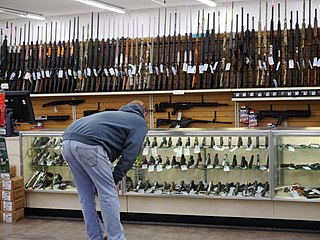
Gun control, or firearms regulation, is the set of laws or policies that regulate the manufacture, sale, transfer, possession, modification, or use of firearms by civilians.

John Richard Lott Jr. is an American economist, political commentator, and gun rights advocate. Lott was formerly employed at various academic institutions and at the American Enterprise Institute conservative think tank. He is the former president of the Crime Prevention Research Center, a nonprofit he founded in 2013. He worked in the Office of Justice Programs within the U.S. Department of Justice under the Donald Trump administration from October 2020 to January 2021. Lott holds a Ph.D. in economics from UCLA.

More Guns, Less Crime is a book by John R. Lott Jr. that says violent crime rates go down when states pass "shall issue" concealed carry laws. He presents the results of his statistical analysis of crime data for every county in the United States during 29 years from 1977 to 2005. Each edition of the book was refereed by the University of Chicago Press. As of 2019, the book is no longer published by the University of Chicago Press. The book examines city, county and state level data from the entire United States and measures the impact of 13 different types of gun control laws on crime rates. The book expands on an earlier study published in 1997 by Lott and his co-author David Mustard in The Journal of Legal Studies and by Lott and his co-author John Whitley in The Journal of Law and Economics, October 2001.

The Brady Handgun Violence Prevention Act, often referred to as the Brady Act or the Brady Bill, is an Act of the United States Congress that mandated federal background checks on firearm purchasers in the United States. It also imposed a five-day waiting period on purchases until the National Instant Criminal Background Check System (NICS) was implemented in 1998. Introduced by U.S. representative Chuck Schumer of New York, the Brady Act was a landmark legislative enactment during the Clinton administration. The act was appended to the end of Section 922 of title 18, United States Code. The intention of the act was to prevent persons with previous serious convictions from purchasing firearms.

Gun politics is defined in the United States by two primary opposing ideologies concerning the private ownership of firearms. Those who advocate for gun control support increasingly restrictive regulation of gun ownership; those who advocate for gun rights oppose increased restriction, or support the liberalization of gun ownership. These groups typically disagree on the interpretation of the text, history and tradition of the laws and judicial opinions concerning gun ownership in the United States and the meaning of the Second Amendment to the Constitution of the United States. American gun politics involves these groups' further disagreement concerning the role of firearms in public safety, the studied effects of ownership of firearms on public health and safety, and the role of guns in national and state crime.

In the United States, a gun show is an event where promoters generally rent large public venues and then rent tables for display areas for dealers of guns and related items, and charge admission for buyers. The majority of guns for sale at gun shows are modern sporting firearms. Approximately 5,000 gun shows occur annually in the United States.

Gun show loophole is a political term in the United States referring to the sale of firearms by private sellers, including those done at gun shows, that do not require the seller to conduct a federal background check of the buyer. This is also called the private sale exemption. Under U.S. federal law, any person may sell a firearm to a federally unlicensed resident of the state where they reside, as long as they do not know or have reasonable cause to believe that the person is prohibited from receiving or possessing firearms.

Gun violence is a term of political, economic and sociological interest referring to the tens of thousands of annual firearms-related deaths and injuries occurring in the United States. In 2022, up to 100 daily fatalities and hundreds of daily injuries were attributable to gun violence in the United States. In 2018, the most recent year for which data are available, the Centers for Disease Control and Prevention's (CDC) National Center for Health Statistics reported 38,390 deaths by firearm, of which 24,432 were suicides. The national rate of firearm deaths rose from 10.3 people for every 100,000 in 1999 to 11.9 people per 100,000 in 2018, equating to over 109 daily deaths. In 2010, there were 19,392 firearm-related suicides, and 11,078 firearm-related homicides in the U.S. In 2010, 358 murders were reported involving a rifle while 6,009 were reported involving a handgun; another 1,939 were reported with an unspecified type of firearm. In 2011, a total of 478,400 fatal and nonfatal violent crimes were committed with a firearm.

Gun-related violence is violence committed with the use of a firearm. Gun-related violence may or may not be considered criminal. Criminal violence includes homicide, assault with a deadly weapon, and suicide, or attempted suicide, depending on jurisdiction. Non-criminal violence includes accidental or unintentional injury and death. Also generally included in gun violence statistics are military or para-military activities.

In 2018, the Small Arms Survey reported that there are over one billion small arms distributed globally, of which 857 million are in civilian hands. The survey stated that American civilians account for an estimated 393 million of the worldwide total of civilian held firearms, or about 120.5 firearms for every 100 American residents.

The Public Safety and Recreational Firearms Use Protection Act, popularly known as the Federal Assault Weapons Ban, was a subsection of the Violent Crime Control and Law Enforcement Act of 1994, a United States federal law which included a prohibition on the manufacture for civilian use of certain semi-automatic firearms that were defined as assault weapons as well as certain ammunition magazines that were defined as large capacity.
Americans for Responsible Solutions (ARS) was a United States non-profit organization and super PAC that supports gun control. The group's stated goal was "to encourage elected officials to stand up for solutions to prevent gun violence and protect responsible gun ownership." It typically supported Democratic politicians in elections. In 2016, the organization merged with the Law Center to Prevent Gun Violence to become Giffords.

A high-capacity magazine ban is a law which bans or otherwise restricts detachable firearm magazines that can hold more than a certain number of rounds of ammunition. For example, in the United States, the now-expired Federal Assault Weapons Ban of 1994 included limits regarding magazines that could hold more than ten rounds. As of 2022, twelve U.S. states, and a number of local governments, ban or regulate magazines that they have legally defined as high-capacity. The majority of states do not ban or regulate any magazines on the basis of capacity. States that do have large capacity magazine bans or restrictions typically do not apply to firearms with fixed magazines whose capacity would otherwise exceed the large capacity threshold.
Daniel W. Webster is an American health policy researcher and the distinguished research scholar of the Johns Hopkins Center for Gun Violence Solutions at Johns Hopkins Bloomberg School of Public Health. He is also the deputy director for research at the Johns Hopkins Center for the Prevention of Youth Violence, and the first Bloomberg Professor of American Health at the Johns Hopkins Bloomberg School of Public Health. In 2016, he became the director of the Johns Hopkins-Baltimore Collaborative for Violence Reduction, a joint crime-fighting effort between Johns Hopkins and the Baltimore Police Department.

Maine Question 3, formally An Act to Require Background Checks for Gun Sales, was a citizen-initiated referendum question that appeared on the Maine November 8, 2016 statewide ballot. It sought to require a background check for virtually all gun transfers in Maine, with some exceptions. As the Maine Legislature and Governor Paul LePage declined to enact the proposal as written, it appeared on the ballot along with elections for President of the United States, Maine's two United States House seats, the Maine Legislature, other statewide ballot questions, and various local elections.
The Dickey Amendment is a provision first inserted as a rider into the 1997 omnibus spending bill of the United States federal government that mandated that "none of the funds made available for injury prevention and control at the Centers for Disease Control and Prevention (CDC) may be used to advocate or promote gun control." In the same spending bill, Congress earmarked $2.6 million from the CDC's budget, the exact amount that had previously been allocated to the agency for firearms research the previous year, for traumatic brain injury-related research.

Public opinion on gun control in the United States has been tracked by numerous public opinion organizations and newspapers for more than 20 years. There have also been major gun policies that affected American opinion in the 1990s. Throughout these polling years, there are different gun control proposals that show promise for bipartisan action. Over the years listed there have been mass shootings, most notably school shootings, that have affected public opinion. There have also been a growth in states around the United States taking more drastic measures on gun control.
The boyfriend loophole is a gap in American gun legislation that allows physically abusive ex-romantic partners and stalkers with previous convictions or restraining orders to access guns. While individuals who have been convicted of, or are under a restraining order for, domestic violence are prohibited from owning a firearm, the prohibition only applies if the victim was the perpetrator's spouse or cohabitant, or if the perpetrator had a child with the victim.

The Bipartisan Background Checks Act is a proposed United States law that would establish new background check requirements for firearm transfers between private parties. It would prohibit a firearm transfer between private parties until a licensed gun dealer, manufacturer, or importer conducts a successful background check.














